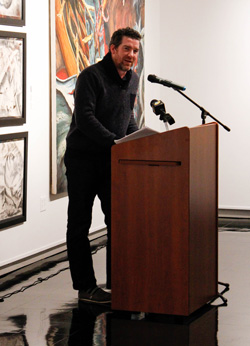Story by Brianna Willis, Staff writer

Louisville author, Adam Day, read some of his poems and from his book, “Model of a City in Civil War,” in front of a captivated crowd.
Adam Day, a Louisville, Kentucky native, stood in front of a crowd at a podium. Day leaned into the mic to speak and dove straight into a poem. The poem was violent, gritty and profane.
As Day read, his body was framed by two paintings. One portrayed a man swimming through a ring of fire; the other a whale being internally destroyed from eating a ship. The painting depicted the whale’s insides wrapped around protruding wood from the ship, while Day recited a poem about a war using vivid and colorful imagery.
ADAM DAY
Day said he grew up in a rough neighborhood in the city. He said his parents always saw the importance in education and had him go to a school outside of their neighborhood.
“There were tons of books in our house,” Day said. “My parents weren’t readers, they were very working class, but they always made sure my sister and I were.”
Day attributes his interest in English to his rough but refined upbringing.
He said there was a sort of “science fair” for literature at his school that was called Young Authors. Watching the older boys he knew who were into punk rock and skateboarding, participate in poetry competitions made poetry more appealing to him, Day said.
“Subgenres always exist and these worlds, punk, skateboarding,” he said. “There is something there that is speaking to people who are searching for an unconventional place.”
He called the hard but soft attributes of his world and friends growing up the aspect that drives his understanding of the world, which he brings to his writing.
THE READING
Day’s poetry in general tackles violence, but he did not shy away from making jokes and inserting humor into his reading. He mostly read from his book “Model of a City in Civil War” in which he pulls from personal experience, historical events and figures to weave together a collection of poems that he said should cause a reaction.
“I deal with the visceral,” Day said. “I like to defend it by saying there is a lot of pretty poetry out there that there is room for some unpretty stuff.”
The historical aspect appeals to Day because he said he finds it fascinating and worth exploring. He included a poem about Abraham Lincoln and one about John Brown and his sons. Day said that by exploring these prominent figures in history, he can humanize them and see them for more than just the president who freed the slaves.
“Poetry focuses too much on ‘the self,’” he said. “By focusing on history it becomes more real, it isn’t all flowers and teddy bears.”
THE READER
Jared Slayden, senior from Clinton, Kentucky, said he found the reading to be refreshing, and said he left with a feeling of lightheartedness.
“He really knew how to keep a college-aged crowd engaged,” he said. “While the subject matter may have been dark, Day himself was a fantastic reader with a great sense of humor.”
Slayden said he read the book before the reading so he wasn’t surprised by the content. However, he was surprised when he read the book the first time. He said that Day’s syntax was powerful and that the darkness worked well with his writing style.
“His subject matter approached violence without the typical disdain you get when reading other poems,” Slayden said. “It is very common place to push away these common occurrences, but Day embraced them.”
What interested Slayden in the writing of the poetry was the surrealist tone with the violent subject matter. He said it created this unique experience of a dreamy, yet very violent image.
Slayden was excited to have a Kentucky poet that wasn’t a typical country poet.
“It really was a fantastic reading,” he said.